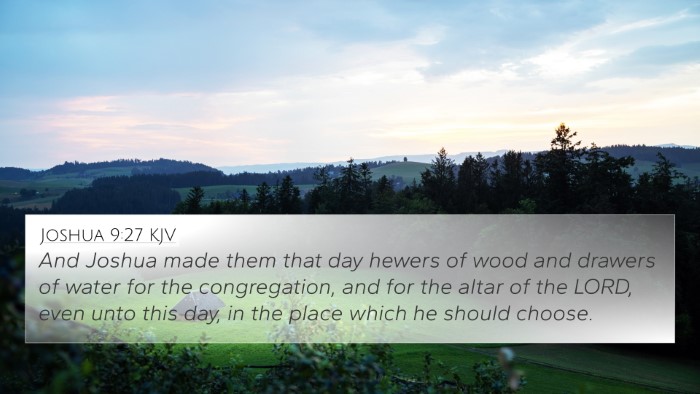Understanding Joshua 9:23
Verse: "Now therefore ye are cursed, and there shall none of you be freed from being bondmen and hewers of wood and drawers of water for the house of my God."
Summary of Joshua 9:23
This verse captures a pivotal moment in the narrative of the Israelites' conquest of Canaan. The Gibeonites, through a deceptive ruse, have secured a covenant with Israel, which brings about an unexpected consequence: they are placed under a curse of servitude. This indicates not only the seriousness of their deception but also illustrates the ramifications that arise when God's people are led astray from their commitment to Him.
Insights from Public Domain Commentaries
- Matthew Henry: Henry emphasizes the importance of faithfulness to God's commands. He notes that the Gibeonites' cunning and deceit led them to a position of servitude, warning that worldly wisdom often leads to spiritual downfall.
- Albert Barnes: Barnes reflects on the covenant's legality and moral implications. The curse signifies the weight of the agreement and serves as a reminder of the seriousness of making oaths before the Lord. He suggests this demonstrates God's sovereignty even when humans err.
- Adam Clarke: Clarke highlights the nature of servitude as a consequence of sin and deception. He also discusses the practical aspects of this servitude, indicating that the labor of the Gibeonites would serve the needs of the Israelite worship and sacrifices, reflecting God's broader plan for His people.
Theological Themes
This verse touches upon several important theological themes:
- The consequence of deception: The verse exemplifies how deceit can lead to long-term repercussions.
- Oaths and obligations: It serves as a reminder of the seriousness of vows made, particularly when invoking God's name.
- Servitude and labor for God: The narrative emphasizes the role of servanthood within the context of divine service and community.
Cross-References for Joshua 9:23
This verse is interconnected with various scripture passages that can deepen understanding:
- Numbers 30:2: Importance of fulfilling vows.
- Deuteronomy 23:4-5: Prohibition against the Ammonites and Moabites.
- Joshua 10:1-6: The reaction of the surrounding nations to the covenant.
- Proverbs 6:30-31: Consequences of deception and theft.
- Ecclesiastes 5:4-5: The significance of not delaying to fulfill vows.
- 2 Corinthians 11:13-15: Discussion of deceit in spiritual matters.
- Galatians 6:7: The principle that one reaps what they sow applies here.
Comparative Bible Verse Analysis
The analysis of Joshua 9:23 in relation to other scriptures reveals a thematic consistency throughout the Bible regarding deception and its consequences. Additionally, the scripture reflects on the faithfulness of God amidst human failure, illustrating a core principle of the faith that God will ultimately guide history and honor His covenants.
Taking Action with Cross-Referencing
For those engaging in a deeper study of the Bible, utilizing tools for cross-referencing can enhance understanding and provide clarity on complex themes. Employ independent studies and cross-reference guides to:
- Explore thematic connections: Identify how themes in Joshua connect with New Testament teachings.
- Analyze Biblical contexts: Delve into the backgrounds of related verses to see how they interact.
- Facilitate sermon preparation: Use these insights to support teaching and preaching efforts.
Using Cross-References for Deeper Understanding
Understanding links between verses can provide greater insight into Biblical teachings:
- Examine the background of servitude as seen in the Old Testament laws.
- Investigate how New Testament teachings link the Old Testament ideas of servitude and freedom in Christ.
- Study examples of covenant relationships and their consequences across scripture.
Conclusion
Joshua 9:23 serves as a powerful reminder of the consequences of deception and the importance of being true to oaths made before God. By exploring the extensive connections between various Bible verses, one can appreciate the comprehensive narrative of faithfulness, judgment, and divine providence present throughout scripture.






